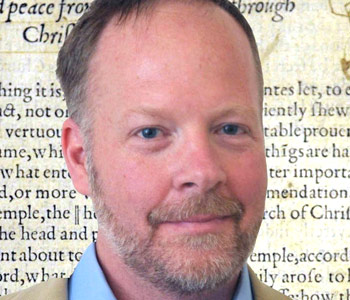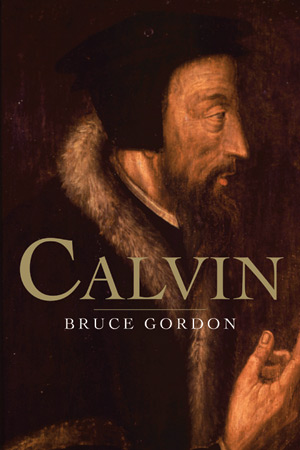
After five hundred years John Calvin remains the object of admiration and loathing. For some he is revered as the great reformer of the sixteenth century whose legacy embraces both the rise of capitalism and modern American democracy. Many others recoil in revulsion at the mention of his name, regarding him as a hateful tyrant who condemned opponents to death, preached an intrusive morality, and with his doctrine of predestination reduced humanity to abject slavery before a capricious God.
Quite honestly, I feel no affinity with either of these camps, both of which shouted loudly during the 500th anniversary of the reformer’s birth in 2009. My biography has an entirely different agenda: to recover an astonishing and complex man who lived an extraordinary life during the most brutal years of the European Reformation.
Drawing heavily on Calvin’s letters, I sought to find what we could know about him; to pursue how we could bring his character to life; and to understand what was so remarkable in this man. What quickly emerged was a person far more interesting than the one I thought I knew, even though I am a historian of the Reformation.
Although anything but the isolated, asexual, embodiment of fixed religious ideas so frequently derided by opponents, the man I encountered was hardly a softer, kinder reformer. John Calvin was a human being of contrary impulses. Brilliant, politic, and shrewd, he believed passionately that ideas and ideals have to be adapted and accommodated to the circumstances of the moment without compromising the truth. And his mind was not static. The ultimate autodidact, he dedicated himself to a punishing regime of study and the refinement of his thinking till the day he died. His was a life of perpetual motion. Calvin was always in the process of becoming Calvin.
“ It was a life lived in many phases. Calvin thought he was going to be a priest, then a lawyer, then a humanist writer. He ended up a Protestant reformer in a backwater city he disliked intensely, and the feeling was mutual.”
The biography seeks to capture the dynamic nature of Calvin’s character; to illuminate how heady interaction with influential friends and enemies, unexpected events, and spiritual and intellectual growth shaped the man. Yet he was more than the sum of circumstances. His prodigious mind, his extraordinary memory, and his unrivalled talent in crafting prose separated him from contemporaries—a fact readily acknowledged by his fiercest opponents. The Institutes of the Christian Religion is an extraordinary piece of theology and pedagogy, setting before the reader a compelling vision of God, creation, humanity, and redemption.
Calvin’s life in the sixteenth-century world, and his relations with the people he loved and served, are what most fascinated me. He surrounded himself with friends and family on whom he depended emotionally, spiritually, and financially. To get inside his world is to meet a broad cast of characters, many of whom left the stage after bitter quarrels. Calvin struggled with his own personality, his friendships, and the frailty of his body. All of these fit uneasily with his profound sense of divine calling.
It was a life lived in many phases. Calvin thought he was going to be a priest, then a lawyer, then a humanist writer. He ended up a Protestant reformer in a backwater city he disliked intensely, and the feeling was mutual. His eyes were always on his native France, yet he had to learn to be a leader to the whole of Protestant Europe, from England to Poland. Exile from France was his greatest burden, yet it was the experience that gave him his voice to a generation of people dislocated for their faith. Calvin spoke as one who had lost everything: he made the trials of the Israelites real to his contemporaries.
The challenge of this biography was to do justice to the many, often contradictory, aspects of Calvin’s life. He was himself aware of the fragmentary nature of his character. It was in the Apostle Paul, I argue, that he found a model to emulate, and he wanted to be Paul to his generation. The great convert to Christianity, Paul was the apostle to all the churches without belonging to any one in particular. He was Calvin’s ideal as the Frenchman devoted himself to the unity of the Church.
Few religious leaders left the security of the city walls to travel the dangerous roads of Europe more than Calvin, though he had precious little to show for it. By the time he emerged as a leading figure in the 1540s the Protestantism of the Reformation was a broken body. Calvin believed that he was uniquely placed to resolve the endless quarrels, but in the end he became stuck in the tar pit that nearly ended Protestantism. His hopes of bringing true religion to France vanished on the battlefields of the Wars of Religion. As he lay dying in 1564 there was meager reason for optimism. Yet after he had gone to his unmarked grave movements claiming his name sprang up that would transform Europe and the New World.
There is no more controversial aspect of Calvin’s life than the execution of Michael Servetus in Geneva in the fall of 1553, an event I treat on pages 217-228, in chapter 13 of the book. This is a subject on which most people have long made up their minds—though rarely on the basis of knowledge. The image of Servetus burning at the stake has sealed Calvin’s posthumous reputation as a monster.
Servetus was a multi-talented Spaniard credited with important discoveries about the circulatory system. But he was also a heretic. His denial of the Christian doctrine of the Trinity was blasphemy to Catholics and Protestants alike. Servetus and Calvin had a long history, dating back twenty years to when both men lived in France. Over the years, Servetus had corresponded with Calvin, sending him his controversial works. Calvin was appalled and sought to end the relationship, confessing to a friend that should Servetus show up in Geneva he would never escape with his life. In August 1553 Servetus did just that, for reasons no one quite understands. Calvin participated in his arrest and, as leading theologian in the city, prepared the case against him.
If Calvin is in turn to be judged for his actions, this case must not be treated in isolation, but rather be determined within its historical context. It is rarely understood that Calvin himself was in a precarious position in Geneva when Servetus arrived. He was locked in a power struggle with the ruling authorities and was losing. He thought he would have to leave the city. The magistrates were not prepared to grant the church independent authority—a position which was a clear defeat for Calvin. Many among his opponents used the Servetus case to embarrass the reformer. Calvin was adamant that Servetus was a heretic and the animosity between the two men was unmistakable. In the end, however, it was the civic council’s decision to have the Spaniard executed. It did so on the advice of the other Swiss cities. Heresy was not regarded as a matter of opinion. It held to be a poison that would kill the community. Calvin’s call for a more humane form of execution was ignored as Servetus went to the stake to be burned with his books. Did Calvin think Servetus should be executed? Yes. Did he want the execution? Probably. Did he have the authority to condemn Servetus to death? No.
The execution of Servetus, however, was quickly attributed to Calvin by a number of opponents closely connected with the printing business. His name was rapidly traduced across Europe and his defensive responses proved impotent. Calvin became associated with intolerance and doctrinal fetishism while Servetus was turned into a martyr for freedom of the conscience. Neither man suited the role granted him. It mattered little that executions for religious convictions were widespread across Europe in the sixteenth century—here was decisive proof that the Protestant reformation was no better than the medieval Catholic church against which it had rebelled.
“ Did Calvin think Servetus should be executed? Yes. Did he want the execution? Probably. Did he have the authority to condemn Servetus to death? No.”
Why does Calvin still matter after five hundred years? That question can be answered in several ways. In his own time, he emerged as a brilliant leader who gave shape to Protestantism at a moment when it might have been swept away by resurgent Catholicism. He refined the teaching of Martin Luther and others to define God’s church in the torrid world of the sixteenth century. He spoke eloquently of a great God who is always near and whose providence, though inscrutable, always works for good. As a lawyer he knew how to draft ordinances and run institutions. As a humanist he wrote some of the most exquisite prose of the century in interpreting God’s Word. His vision was of God’s people journeying through the world under the unshakable protection of the divine promises. God’s providence may be rough, but it is always good, and God never abandons the elect. The world is the wonderful manifestation of God’s creation and goodness, and humanity is called to mirror God’s righteousness through service. All his life Calvin wrestled with the seeming paradox of an utterly sovereign God and human agency. This is more than a conundrum: it is the creative tension of his legacy.
Calvin’s life was not a completed circle. When he died many of his most cherished dreams remained far from realized. His native France was engulfed by what he most feared: executions and religious war. Many of his fellow French had not embraced the Gospel in the manner he had wanted. Across Europe Protestant churches were far from united. In England an irate Queen Elizabeth refused to hear his name mentioned.
Yet the ideas by which he had so inspired his contemporaries continued to rouse others after his death. Calvin had created new possibilities for the secular world by envisaging the separation of spiritual and temporal authority. Rulers, in Calvin’s view, were to protect religion, not interfere in it. As Max Weber would famously identify, Calvin and Calvinism spawned cultures in which the search for assurance of salvation would shape patterns of behavior. This was true of English Puritans and the settlers of New England.
Calvin had preached and written for his age. Others would subsequently take his words and ideas and interpret them in new contexts. In the Dutch Republic of the seventeenth century and the Atlantic world of trade Calvinists would prove adept in the adaptation of economic and religious principles. These issues are still with us. The rise of Calvinism in Korea and the new forms of Neo-Calvinism in America demonstrate diverse engagements with the ideas of the man who had shaped his own age, that most crucial epoch, the European Reformation.


Bruce Gordon is the Titus Street Professor of Ecclesiastical History at Yale Divinity School. He also teaches in the History Department and Renaissance Studies at Yale. Before arriving in New Haven in 2008 he was Professor of Early Modern History at the University of St. Andrews in Scotland. He is the author of the Swiss Reformation (Choice Magazine Outstanding Publication, 2003) and has edited numerous books, including (with Peter Marshall) The Place of the Dead. Death and Remembrance in Late Medieval and Early Modern Europe (Cambridge, 2002). He is currently in the midst of finishing two projects: a study of Bibles in the Reformation period, and a history of fifteenth-century Europe. Bruce Gordon is a Fellow of the Royal Historical Society.